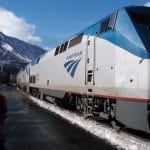CHARLESTON, W.Va. – U.S. Rep. Nick J. Rahall told West Virginia union leaders on Tuesday that people who believe cheaper, non-union labor is good for American business are “short-sighted.”
“Union labor also helps increase corporate America’s bottom line with your safety standards and the quality of your work,” Rahall said at the event hosted by the State Building Trades Council.
Read the complete story at the Charleston Gazette.
Tag: Rahall
CHARLESTON, W.Va. – U.S. Rep. Nick J. Rahall told West Virginia union leaders on Tuesday that people who believe cheaper, non-union labor is good for American business are “short-sighted.”
“Union labor also helps increase corporate America’s bottom line with your safety standards and the quality of your work,” Rahall said at the event hosted by the State Building Trades Council.
Read the complete story at the Charleston Gazette.
 WASHINGTON — Committee on Transportation and Infrastructure Chairman Bill Shuster (R-Pa.) and ranking member Nick J. Rahall II (D-W. Va.) April 16 announced the members of a special panel tasked with examining the current state of freight transportation in the United States and how improving freight transportation can strengthen the U.S. economy.
WASHINGTON — Committee on Transportation and Infrastructure Chairman Bill Shuster (R-Pa.) and ranking member Nick J. Rahall II (D-W. Va.) April 16 announced the members of a special panel tasked with examining the current state of freight transportation in the United States and how improving freight transportation can strengthen the U.S. economy.
The full committee’s Vice Chairman, Rep. John J. Duncan Jr. (R-Tenn.), will chair the “Panel on 21st Century Freight Transportation.” Rep. Jerrold Nadler (D-N.Y.) will serve as the panel’s ranking member. By the rules of the committee adopted at the beginning of the Congress, the special panel will serve for a period of six months, beginning with its first scheduled hearing on April 24, 2013.
The Republican members of the panel are: John J. Duncan Jr., Tenn., chairman; Gary Miller, Calif.; Rick Crawford, Ark.; Richard Hanna, N.Y.; Daniel Webster, Fla.; and Markwayne Mullin, Okla.
The Democratic members of the panel are: Jerrold Nadler, N.Y., ranking member; Corrine Brown, Fla.; Daniel Lipinski, Ill.; Albio Sires, N.J. and Janice Hahn, Calif.
“Given that freight transportation cuts across many modes, this panel will play a critical role in providing recommendations on how to improve the efficient movement of goods between highways, ports, inland waterways, railroads, air carriers, and pipelines,” said Chairman Shuster. “I am confident Chairman Duncan and the members of the panel will provide the committee with valuable insights for the improvement of freight transportation and our nation’s economy.”
“Almost all manner of goods sold or produced in this country take a ride on our rails, pass through our ports, wind down our waterways, or travel our highways,” said ranking member Rahall. “The smooth movement of cargo across all these modes of transportation is essential in keeping our economy moving which is why this panel’s task of improving the efficiency of our interconnected freight network takes on such importance.”
“In the past, the conversation about freight transportation and goods movement has focused only on one specific mode of transportation or another,” said Rep. Duncan, the new panel’s chairman. “But freight doesn’t move just by ship, or by rail car, or by truck. Chances are the goods you buy at the store got on the shelves thanks to all those methods of transportation. Bottlenecks during any leg of that journey from the manufacturer to the market drive up costs. That’s why improving the flow of freight across all modes of transportation is so critical to a healthy economy.”
“The movement of freight is one of the most critical transportation questions for the 21st century,” said Rep. Nadler. “How we prioritize, invest, and develop freight infrastructure will have considerable bearing on how our economy grows, how we compete on the world stage, and how we create a sustainable and environmentally clean future at home. I look forward to working with Chairman Duncan and my other colleagues on this important panel to give freight movement the attention it deserves.”
WASHINGTON – Legislation to privatize Amtrak’s Northeast Corridor, as a first step toward destruction of Amtrak, will almost certainly be dead-on-arrival in the Democratic-controlled Senate, and will face a tough challenge in the Republican-controlled House; but the authors of the bill – House Transportation & Infrastructure Committee Chairman John Mica (R-Fla.) and House Rail Subcommittee Chairman Bill Shuster (R-Pa.) – continue to press ahead.
And beyond the slim likelihood this legislation might pass both the House and Senate, it is highly unlikely to survive a judicial challenge.
According to the senior Democrat on the House Transportation & Infrastructure Committee, Rep. Nick Rahall of West Virginia, the bipartisan Congressional Research Service reported to him that the Mica/Shuster proposal is probably unconstitutional.
The Mica/Shuster bill violates the Appointments Clause and the Takings Clause of the Constitution, Rahall said in referencing the information he obtained from the Congressional Research Service.
The Transportation Trades Department of the AFL-CIO warned that the Mica/Shuster proposal would cancel labor agreements covering all of Amtrak’s unionized workers, and eliminate coverage under the Railway Labor Act and the Railroad Retirement Act.
Sen. Frank Lautenberg (D-N.J.) previously said the Mica/Shuster bill has “no legs” in the Senate. Nonetheless, said a UTU official, “The legislation remains a rat hole worth watching, and our National Legislative Office will work diligently toward its defeat.”

The UTU and other rail labor organizations are gearing to fight this effort to privatize the Northeast Corridor, which would be the first step toward eliminating Amtrak on the Northeast Corridor as well as its long-distance passenger trains outside the Northeast Corridor. The proposal likely would destroy America’s national rail passenger network.
Mica and Shuster said they will introduce legislation to strip from Amtrak its ownership of the Northeast Corridor – linking Washington, D.C., Baltimore, Philadelphia, New York and Boston – and look to unnamed private operators to bid on operating high-speed passenger trains on the 437-mile long corridor.
Destruction of Amtrak could cause a crushing financial blow to the Railroad Retirement system if private operators were permitted to place their employees under coverage of Social Security rather than Railroad Retirement.
“I think we can make the service even better and reduce subsidization,” Mica said. “The whole concept of this is attracting private capital.” He opposes an Amtrak plan to operate 220-mph trains over the corridor in the future, saying so-far unnamed private operators could provide better service at a much reduced cost to taxpayers.
Amtrak President Joseph Boardman responded, “The Mica/Shuster proposal takes Amtrak apart only to put something in its place that looks quite similar.
“The Northeast Corridor is not just a piece of real estate,” Boardman said. “It is a major transportation artery and a vital component of the regional economy, carrying more than 250,000 intercity and commuter passengers every day. Amtrak provides the region the best opportunity to achieve the needed improvements. The Northeast Corridor is a success under Amtrak stewardship and many components of our next-generation high-speed rail vision plan are already moving forward.
“We don’t want to run the risk of adopting something that won’t work, that compromises safety, or that simply costs more than we can afford,” Boardman said. “The last thing the Northeast needs is a plan that’s poorly thought through and that doesn’t take key issues into account.”
Boardman recently told a rail labor group that privatization of British Rail has not been a success and increased costs.
Former Amtrak President David Gunn was blunt in a statement he made about British Rail privatization when Gunn ran Amtrak: “Since privatization [of British Rail], the system has had more accidents and delays.” And former Amtrak President Tom Downs, when he ran Amtrak, called privatization of British Rail “a disaster … They have multiple rail companies and fares, and trouble even issuing a national ticket.”
The conservative Economist magazine reported in 2005, “The privatization of British Rail has proved a disastrous failure … a catalogue of political cynicism, managerial incompetence and financial opportunism. It has cost taxpayers billions of pounds and brought rail travelers countless hours of delay.”
In responding to the Mica/Shuster proposal, Transportation Secretary Ray LaHood said, “Amtrak is the entity most capable of taking the next steps to modernize rail service in the Northeast Corridor.”
The Mica/Shuster proposal, which likely will have support of the House Republican majority, will face tough opposition in the Democratic-controlled Senate.
Sen. Frank Lautenberg (D-N.J.), said June 15, “I will fight in the Senate to stop any plan that threatens Amtrak and commuters on the Northeast Corridor.”
Sen. Robert Menendez (D-N.J.), said the Mica/Shuster proposal “makes as much sense as privatizing Medicare or Social Security. In other words, no sense at all.”
Senate Republicans also are likely to oppose the Mica/Shuster proposal. The current ranking Republican on the Democratic-controlled Senate Commerce Committee, Kay Bailey Hutchison of Texas, told The Washington Post some years ago, “There will be a national system or there won’t be an Amtrak at all.”
In fact, in passing the Passenger Rail Investment and Improvement Act of 2008, a bipartisan congressional majority said, “It is the sense of the Congress that long-distance passenger rail is a vital and necessary part of our national transportation system and economy; and Amtrak should maintain a national passenger rail system.”
Rep. Nick Rahall of West Virginia, the senior Democrat on the House Transportation & Infrastructure Committee, said of the Mica/Shuster proposal, “They want to hand over the conductor’s cap to the same folks who ran the stock market off a cliff. Privatizing passenger rail in the Northeast Corridor will not merely affect train service in that region; it will have a crippling domino effect on train service from sea to shining sea.
“Because of its national scope, Amtrak is able to invest profits from [its profitable Acela service on] the Northeast Corridor to offset less profitable long-distance lines in other parts of the country,” Rahall said. “Two years ago, the U.S. Department of Transportation invited proposals from private companies to develop high-speed rail in the United States. Not one single proposal was submitted by the private sector for developing high-speed rail in the Northeast Corridor. Not a one.
“We ought to be looking at ways to help Amtrak achieve the goal of high-speed rail; not looking at ways to dismantle it,” Rahall said.
WASHINGTON — Rep. Nick Rahall (D-W.Va.), a long-time friend of the UTU, will be the ranking Democrat on the House Transportation & Infrastructure Committee when the new Congress is seated in 2011.
With the defeat Nov. 2 of Rep. Jim Oberstar (D-Minn.), who had been chairman of the committee and would have become the ranking Democrat when Republicans take control, Rahall will be exercising his seniority to become the lead Democrat on the T&I committee.
The move was confirmed Nov. 9 by the publication, POLITICO, which cited, as its source, a spokesperson for Rahall.
Most air, bus and rail transportation legislation before the House of Representatives is first considered by the T&I Committee.
The Republican expected to chair the T&I Committee is Rep. John Mica (R-Fla.).
Rep. Bill Shuster (R-Pa.) is expected to chair the committee